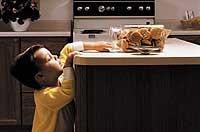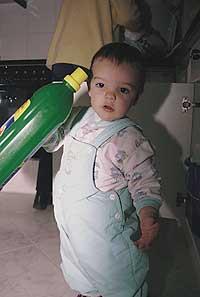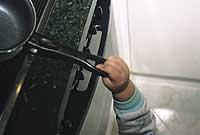Are we safe at home?
In the kitchen
In the bathroom

Although they usually occur involuntarily and the trend of recent years shows a downward trend, the figures remain terrifying. Last year, according to data published by the Ministry of Health and Consumption, almost 2,500 people died as a result of two million domestic accidents. And what are the most affected? Those who spend more time in housing: children and women.
General measuresMany (and often we would not have imagined) are the places and things that can cause an accident inside the house. Therefore precautionary measures should be taken. It is not a matter of being afraid at home, of banning everything or, at the other extreme, of cutting off the natural curiosity of the child and not letting him carry out normal activities for him. But even accepting all this, there are some basic measures to take to live in an atmosphere of tranquility:
- Cover plugs with protectors. This simple measure prevents accidents and is very economical.
- Do not leave scissors, needles or other sharp tools that are used for sewing work within reach of children.
- Store the toolbox well (hammers, pliers, screwdrivers, etc.) and also remove the batteries of children.
- Place the caps on the main doors of the house (for example in the bathroom or in the living room), with the child closed inside, so that it does not leave.
- Don't teach kids where to store medicines or toxic products. Take special care of dangerous product containers (bleaches, gouache and the like), even empty. They should be kept or left where children do not arrive.
- The glass table can be dangerous if the child goes through its surroundings. Protects the corners of the table.
- Plastic bags can also be dangerous (young children can put their heads in and choke).
- If you have stairs inside the house, until the child sees that it is safe, close the step so that it cannot move on its own.
- The pool or pool should always be protected, with a kind of net, while not accompanied by children.
- Toys should be suitable for children's age. Follow manufacturers' directions to avoid unnecessary risks such as swallowing small parts.
- Do not place chairs or other seats around windows or balconies. The curiosity of young children is impressive and, to make him realize, you will have the child looking at the edge of the balcony.

In principle any room can be the place where an accident occurs, but all surveys and statistics indicate that the kitchen and bathroom are the places where most accidents occur. Therefore, specific precautionary measures are necessary in these two areas, which should be almost common:
- Never leave the child alone in the kitchen with fire or oven on.
- Store all cleaning products in a relatively high place, never under the sink (as is customary in almost all houses). The child is attracted to the colors of the detergents and many intoxications occur with them.
- Be especially careful with pointed tools (knives, scissors, etc.) and also with matches.
- Always keep the door closed to the terrace and leave nothing that can attract the child: toys, bicycle, beach shovels, etc.
- Kitchen appliances (oven, washing machine, microwave, etc.) should be out of reach of children and, in case of security closures, better.
- Be careful with the iron or iron, even if it is off.
- The soil should always be dry to reduce the risk of slipping. As soon as you leave the bathtub, footwear (flip-flops, e.g.) teach children the habit of dressing.
- Check the water temperature before entering the bathtub.
- In case of having appliances in the bathroom, unplug them and remove them from the hands of children.
- Store razors in a closet where the child does not arrive after use.
- If the medicine cabinet is in the bathroom (although it is not a good habit) close it with the key and do not say it too much in front of the children.
- Try to be calm, you'll have the clearest ideas and you'll be better off than playing strips and blinds.
 Never leave the child alone in the kitchen with fire or oven on.B. Cork
Never leave the child alone in the kitchen with fire or oven on.B. Cork - Call emergencies. Your phone contact is a professional who will know how to act better. If necessary, you will be sent an ambulance or a doctor and told what to do until they arrive.
- Meanwhile, place the child in a relaxed position. Keep it well dressed so you don't feel cold or hot.
- Prioritize life-threatening injuries: bleeding, poisoning (although only suspected). And if the child has no pulse and/or breathes and is in a state of shock, perform mouth to mouth breathing or cardiac massage, but only if you know.
- Do not collect the child from the ground if it is not necessary, even if you suspect that he has a fracture. Do not give anything to drink.
- Do not use alcohol.
- Try to control bleeding. Bleeding is severe if it lasts more than 4-10 minutes and impregnates with blood a clean cloth placed on the wound and slightly crushed. If the bleeding is on a limb, raise the arm or leg. Don't use turnstiles because if you don't do it right they can cause more damage than benefits.
- Do not do anything that is not really necessary or with the assurance that it will benefit you. The professionals who come to collaborate are underway. Calm yourself and relax while the child.





